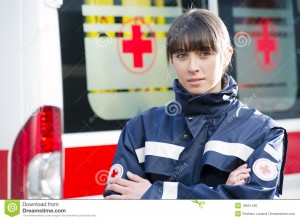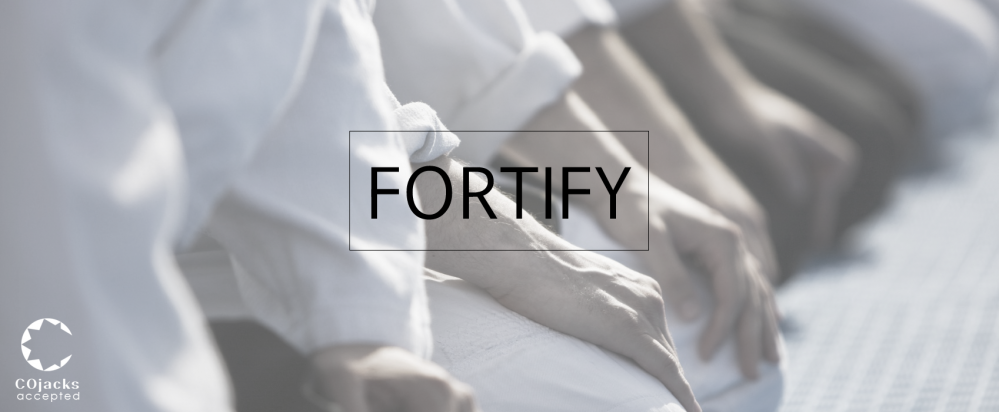I’ll never forget the first time I saw a limb amputation on a call. This guy, after taking a boatload of morphine (yes, that’s totally a unit of measurement), decided to hop on his motorcycle and ended up running into the back of a van. We got there and found his leg hanging on by just a flap of skin.
 You can use google if you need a visual reference
You can use google if you need a visual reference
I won’t get into the particulars (the smell is what sticks with me the most), but that guy was lucky, because within minutes of his collision with the van, the Fire Dept, Law Enforcement Officers, and EMS all showed up to take care of him and manage the scene. That’s pretty normal in this country. We’re fortunate enough to have a wonderful 911 system, where you can call and within minutes (hopefully) professionals will show up to deal with just about any emergency you can throw at us. On this particular call, from the time we (on the ambulance) were dispatched to the time we made it to the ED at the hospital, took a total of 17 minutes. All things considered, that’s not bad. We had to drive to the scene, package the patient for transport, which included moving the patient (carefully) into the ambulance, and then driving to the hospital. En route, we managed to get two IV lines open, get a full patient medical history, complete a full trauma assessment, and not spill our coffee.
 Go ‘head girl, brush yo shoulders off….there’s still blood on ’em
Go ‘head girl, brush yo shoulders off….there’s still blood on ’em
I’m not telling this story because I want to impress you (unless you’re Anna Kendrick, in which case, Miss Kendrick, I also play three instruments, sing, cook…), but because I’m slowly getting to making a point. Here’s a question: for those of you aren’t trained responders, how comfortable would you be hopping out of your vehicle and providing care for that patient? Would you know what to do? Do you know how to clear Nexus on a trauma patient? Do you know how to gather a medical history, take vitals, start an IV? No? Yeah, it was a stupid question really, but it brings me to my point: TRAINING IS IMPORTANT. Seems pretty obvious, given this particular scenario, but for some reason people often feel this doesn’t extend to other areas of their life.
Here, at Fortify, we’re primarily concerned with fighting, and a lot of you ended up here because you were concerned with self defense. If you’re making it in to the dojo on a regular basis, you’re already on the correct path (as far as fighting and self defense), but for some reason a lot of people (mostly males, it’s true) have this idea that they have an innate ability to fight. As with medicine, while you may be naturally gifted when it comes to fighting, without training,you’re going to have a lot of holes in your game.
If you’ve never seen the first UFC, check it out. This was prior to MMA becoming it’s own style and instead sought to answer the question: “which style is the best?” For those of you who have been martial artists for awhile, you know this question is as old as time, and kind of dumb (generally speaking). Most of us aren’t fighting in cages, trying to test our style against someone else’s. And the truth is, having a good amount of training in almost any legitimate martial art, is going to give you an edge over the drunk guy at the bar who decides to puff up his chest and start a shoving match.
That being said, when Royce Gracie walked into the octagon at UFC 1, the world of martial arts was forever changed. This guy brought Brazilian Jiu-Jitsu into the limelight and he did so in spectacular fashion. Boxers, karate and kung fu practitioners, and even wrestlers, found their skills mostly neutralized when tangled up in Gracie’s legs and arms, as they slowly succumbed to chokes, arm bars, and leg locks. None of these guys had trained in this type of grappling, so they weren’t prepared to deal with it. I guess we could be nitpicky and say what this really demonstrates is the need to be well rounded as a fighter – but the bigger picture point is still the same.
Still Not Convinced?
Ok, so you’re a big strong guy, you have a jaw made of steel, you bench press 300lbs, and you’re 6’5″ and weight 250lbs. Realistically you’re not likely to get into many fights that you aren’t either starting, or stepping into. If I decided to be a jerk and pick a fight somewhere, it wouldn’t be with you. BUT, another guy your size, who decides to be a jerk, might decide you look like a fun challenge. As Bully Beatdown showed us, for three glorious seasons, before its cancellation-being big and strong isn’t the same as being big, and strong, and knowing how to fight:
Let’s go back to medicine and helping others for a second now. Have you ever heard of the “Bystander Effect?” It says that *YOU* won’t stop to help someone in need, if you witness them lying on the ground, being abducted, or becoming a victim of a crime. You probably just thought “of course I would!” but the numbers don’t lie. Unless you’ve been trained to do so, you won’t help. This doesn’t make you a bad person, it just makes you a normal person. Those of you who thought this through a little more, may have said to yourself “well I’m not trained to help sick/injured people.” And that’s fine, BUT how often do you take the time to call 911 when you witness a motor vehicle collision, or see someone lying on the ground where they shouldn’t be?
I was in Las Vegas a year ago with some friends and as we were walking down the strip, I saw a man obviously unconscious on the sidewalk. We stood there for just a brief moment and watched hundreds of people walk by, stepping around and even over this man. I, like my companions, was so drunk it was really a miracle we were still ambulatory. We chose not to render aid, as we felt in our inebriated states that we were probably not much good to the man. Instead, we called 911. We were the first people to call and I have no clue how long this guy had been lying there. Again, I’m not bragging, or trying to paint a picture of myself as some kind of wonderful person. I called 911 because that’s what I was trained to do when I wasn’t the person currently behind the wheel of the ambulance.
So in your head you may see yourself someday performing heroic deeds-breaking up bar fights, performing CPR, and rescuing kittens from trees. But you should ask yourself: if I’ve never done these things before, why do I believe I will someday in the future, if I change nothing about myself now? The answer is simple: you won’t. Unless you start training/learning/changing today, you won’t do anything differently tomorrow.
How We Train:
For those of you who don’t know, I’m primarily a firearms instructor. A lot of the training we do, involves running drills based on real life scenarios. Most of you are probably familiar with the Mozambique Drill, though you’ve probably heard of it referred to as something else. This shooting drill involves placing two rapid shots in the body and then following up with one shot to the head. It’s a classic drill and while I’m not personally a fan of it (just put the first round in the head. If you have the ability to make a head shot, why not start there? And yeah yeah yeah, it’s a small target so we generally train to shoot center mass, but given the acute stress in this situation, what makes you think you’re going to make that third shot to the head, if you don’t have the ability to make the first shot to the head?) it has its place and history has shown it to be valuable. Drills like the Mozambique Drill and the Tueller Drill both exist because of real life situations that lead to their creation. It’s important not just to train, but to train for real life.
Training Properly:
Alright, so at this point, I hope you get the importance of training. And I don’t just mean in fighting. Whatever it is that you want to do, you need to train to be good at. No one’s good at cooking their first time in the kitchen. No one throws a well aimed 100mph fastball the first time they pick up a baseball. I got scratched by a lot of cats, before I figured out you can’t just flip ’em over and go straight for the belly rub. But as important as it is to train, it’s equally important to make sure you’re training correctly. If you want to run a marathon, it’s important to run. Some things, like swimming and rowing, may help you overall, in achieving your goal, but repping out 100 pull-ups everyday, while certainly not bad for you, probably isn’t going to benefit your distance running a lot. That’s maybe not the best example, so let’s look at the Newhall Massacre.
I’ll let you read the Wikipedia article there if you want all the details, but if you scan the “aftermath” section of that article you’ll notice a few training issues. The biggest training issue that gets cited when people discuss this incident, turned out to be a rumor. However, the fact that people were stating Officer Pence had stopped to pick up his spent brass off of the ground, in the middle of a gunfight, due to a habit he had formed while training on the range is still telling. The habits we develop while training, we often take out into the world. It is important to not habitually perform actions that are unnecessary to what you are studying and also to vary your routine while studying. The Mozambique Drill, that I mentioned earlier? I do variations on it in training, but the variation I do today, rarely looks like the variation I did yesterday.
My biggest issue with Officer training, cited in that article, was that Officers were trained using .38 Special rounds, but then found themselves out on the street with .357 Magnum loads. I tell people all the time in training to practice with their carry gun. I have a nice full size Beretta 92A1 at home and I train with it, because it’s my home defense gun. However, I carry a Glock 26 at work, so I practice more frequently with that gun. They’re both chambered in 9mm Parabellum, and of course the *basic* operation is the same. But my Beretta is a full sized gun and my Glock is just a wee little itty bitty guy.
That is uh…not the picture I was looking for, but you get the point
So even though both guns share a lot of similar characteristics, they both feel a little different. The shorter barrel on the Glock makes maintaining good shooting fundamentals even more important than with my Beretta, because the round leaves the chamber much sooner. The size of the gun also means the Glock has a bit more felt recoil, or “kick,” to it. Because I have tiny, girlish, hands, I actually handle the Glock a bit better than the Beretta, but I spent several hundred hours on the range with both before I felt like I could really confirm that and not just chalk it up to a lack of training time with one.
Alright, rant over. You’re either going to start training in that thing you want to do and be good at, or you’re not-and you’ll hope one day you’ll just magically figure it out, I guess. But I’m not any good at scuba diving 30 years into my life, despite sometimes wishing I was, because I’ve never done any training in scuba diving. Ultimately I’d rather be on the range and it shows, because instead of spending money on scuba lessons, I buy ammo and range time. I sincerely hope that if you play out heroic day dreams in your head, that you one day step up and start training to fulfill those dreams, because I’m afraid of heights and SOMEONE has to rescue those kittens.



